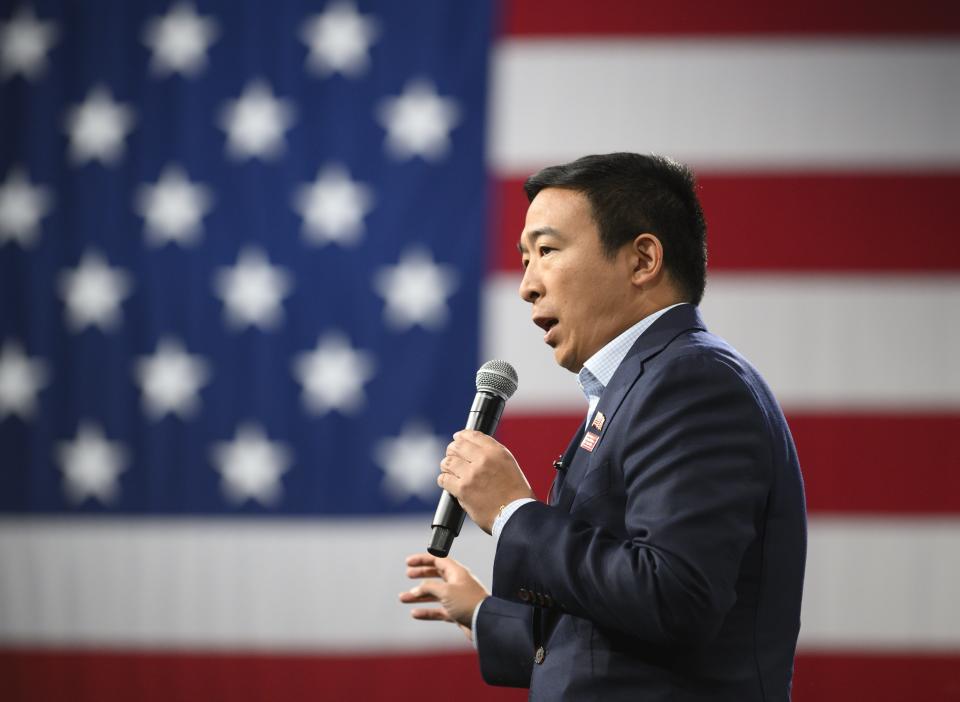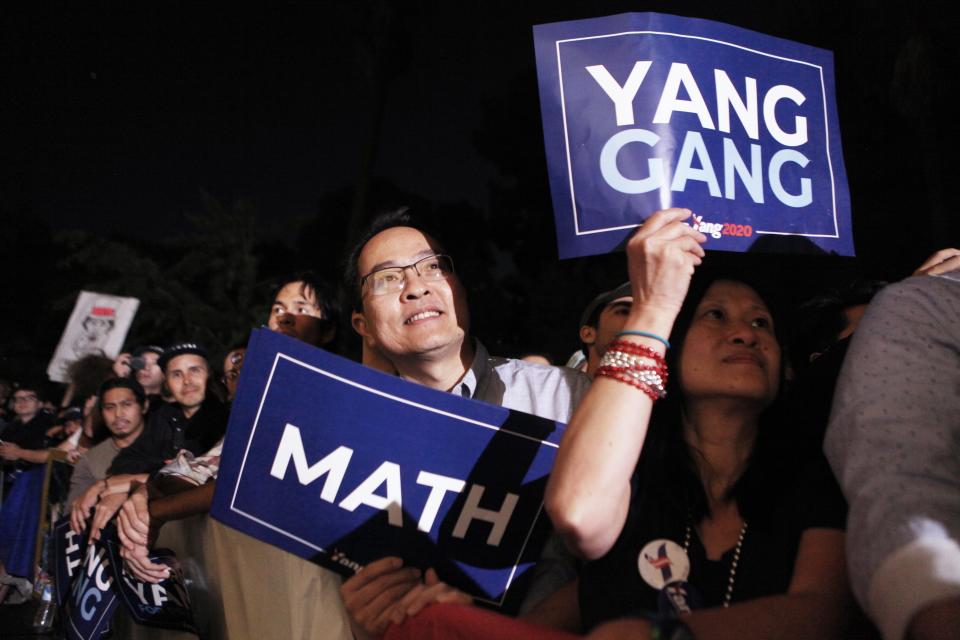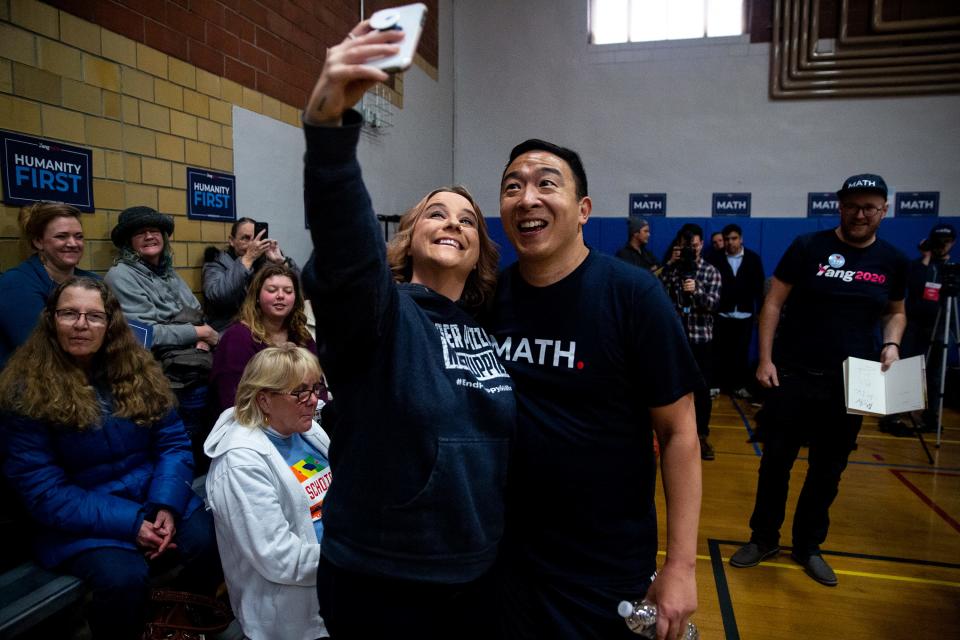Andrew Yang has defied expectations. Can he turn that into a 2020 win?
WASHINGTON — Jason Woltz had never donated to a political campaign before.
But after he saw Andrew Yang in late August on the H3 Podcast, a comedy podcast show, Woltz shipped the campaign $20.
“He seemed very genuine,” Woltz said of Yang. “I think that's a difficult quality to find.”
Within a week Woltz, 34, who is from St. Leonard, Maryland, started laying the groundwork to create a local Yang Gang chapter in Southern Maryland.
Woltz’s story is like that of many other Yang supporters: They maybe didn't know much about him a year ago when Yang launched his campaign. They heard him on a podcast or something similar. They liked him, and then they got involved.
Augmented reality: Andrew Yang shares his views on issues in this interactive experience
Propped up by eager supporters and a series of buzzy moments at debates, Yang has moved toward the mainstream this year. He has hauled in millions of dollars in fundraising, out-raising sitting senators. And though he still polls in the middle of the pack at single digits, his polling and fundraising levels have been high enough to qualify for every debate.

On Thursday, Yang was the only nonwhite candidate on stage at the sixth and final Democratic debate of 2019. He has outlasted seasoned politicians, such as Sen. Kamala Harris, Sen. Kirsten Gillibrand and New York City Mayor Bill deBlasio, who entered the race with much higher national profiles.
An interactive guide: Who is running for president in 2020?
On the issues: Where Andrew Yang stands on health care, climate change and other issues
While Yang's future in the ever-changing primary race is unclear, his candidacy has undoubtedly made a mark on the Democratic primary and possibly the electorate for the general election. Yang has honed in on a message of the Fourth Industrial Revolution, touted the need for a nationwide universal basic income and boasted about his ability to reach voters who have become disaffected by national politics.
But as the qualifications to reach the debate stages continue to tick up, and the race speeds toward the first-in-the-nation Iowa caucuses, candidates face a narrowing window of time to make their case to voters. Yang has to harness the energy of a diverse coalition of newly activated voters while also appealing to the broad Democratic electorate. In a field of more than a dozen candidates, the time to stand out is now.
The Yang Gang
After Woltz donated to Yang’s campaign, he rhetorically asked on Twitter whether his donation made him part of the Yang Gang.

Almost immediately there was “just like a flood of love coming that I've never experienced an online setting before” from other Yang supporters, welcoming him to the now-famous Yang Gang, Woltz said.
Yang's rise to prominence is in large part due to those devoted supporters.
At rallies, Yang's followers chant "MATH" after any mention of the word. (It's an acronym for "Make America Think Harder," the logo emblazoned on Yang's campaign merchandise.) His supporters are active on Twitter, with accounts marked by a ubiquitous blue hat emoji, and can flood user's mentions if they believe Yang has been wronged or received unfair treatment. At the Iowa Democratic Party's Liberty and Justice Dinner in November, the Yang Gang held lit "Y" signs and shouted back every answer to Yang's rhetorical questions about his signature policies.
Mark Jones, a fellow in political science at Rice University's Baker Institute for Public Policy, said Yang benefits from trying to grow his support with voters beyond the Democratic Party base.
"It's going to be quite difficult (for him to win the nomination), but I think if you would have asked most observers a year ago if Andrew Yang would be appearing in the debate while Bill de Blasio, Tulsi Gabbard, Steve Bullock would not, I think they would have said that's not going to happen," Jones said.
As Democrats look to win back voters who either switched to Trump or sat out in 2016, the diverse coalition Yang has attracted is valuable. Yang’s following – which includes Never-Trump Republicans, Libertarians, tried and true Democrats, and Democrats who are disenfranchised by the establishment – could be a benefit to whomever the Democratic nominee is.
Colleen French of Elgin, Illinois, voted for Donald Trump in 2016, but has been dissatisfied with him and his presidency.
French, 56, described herself as a lifelong conservative, but noted she did vote for former President Barack Obama. She first learned about Yang from her 23-year-old son, Joe. After watching some interviews, she was struck by Yang's charisma and his direct, succinct answers. She said Yang doesn't tell stories to avoid answering questions, unlike career politicians.
"He just comes across as a guy that you would like to sit and have a beer with," French added. "I'm not sure I can say that about any of the others that are running."
And regardless of who the Democratic nominee is, French said she will support them.
French is the kind of voter Yang speaks about frequently, touting his belief that he alone has the ability to peel away large swaths of Trump voters.
"I'll peel off tens or hundreds of thousands of disaffected Trump voters, independents and libertarians, add to the Democrats and progressives, and we win this thing hands down," Yang told USA TODAY in September.
While Yang has brought in some Republican and former Trump supporters, he has also inspired some supporters to become more politically engaged.
Alberto Jimenez, a 30-year-old from Long Branch, New Jersey, said he had followed Yang for over a year, but a May rally in Washington Square Park in New York City is what really made him feel like a part of the Yang Gang.
At that rally, Jimenez met Christine Conforti, who is running for New Jersey’s 4th Congressional District. That seat is currently held by Rep. Chris Smith, the only Republican in the state’s House delegation.
After connecting with Conforti, Jimenez said, “it ended up spurring this latent political involvement that I had not really been involved prior to this.”
“I think that can attest to the power of the normal man that is Andrew Yang. If nothing, even if Andrew doesn't win, this is good for America," Jimenez said.
"This is good for our political discourse. It's good for pulling people who are not politically active, like I wasn't, off of the couch and actually excited to go to an event.”
UBI and the Fourth Industrial Revolution
Jones, the political science fellow, said that Yang hasn’t just grown a following, he has also changed the conversation by bringing his core policies to the forefront, honing in on a message related to jobs and economic growth.
Throughout the campaign, Yang has said Trump was first elected because he talked about the loss of jobs.
Yang in turn has made that his primary focus, warning about the effects of the Fourth Industrial Revolution, where technology such as artificial intelligence and robotics would affect jobs and the way people live. He talks about the downside of automation and how robots will soon take over the jobs that many Americans, particularly middle class families, rely on to make their living.
About 25% of jobs could be affected by automation in the United States, according to a Brookings Institution report published in January. Jobs in food service are the most likely to be lost to automation, the report found.
“Artificial intelligence is still going to get faster and smarter. The robot trucks are going to come closer to the highways. Amazon will still be paying zero in taxes,” Yang said during a rally at George Mason University in November. “We have to rewrite the rules so they work for us, they work for you – particularly the young people.”
Andrew Yang: Being the free-money guy won't hurt me
Yang’s opponents and the media have taken notice of this message.
During the October debate, CNN moderator Erin Burnett asked the candidates on stage how they would prevent job losses because of automation, citing the 25% figure. It was the first time that Yang’s core issue was brought up on a national debate stage.
Sen. Elizabeth Warren, one of the top candidates in the race, downplayed automation’s role, instead saying “the data show that we’ve had a lot of problems with losing jobs, but the principal reason has been bad trade policy." Sen. Bernie Sanders, another top candidate, noted that his solution would be a program that would guarantee a federally funded job.
And while it got attention on the debate stage, Yang said only one of his Democratic opponents has personally raised their concerns to him about the Fourth Industrial Revolution.
“The only person who has taken me aside and said that we need to worry about the Fourth Industrial Revolution, because it could potentially tear our country apart, is Joe Biden,” Yang told the Washington Post in October.
The Biden campaign said the former vice president and Yang did speak at one of the debates, during a commercial break. In 2016, Biden had raised concerns about the Fourth Industrial Revolution at the World Economic Forum in Davos, Switzerland, saying "This revolution is going to require governments to refocus on core obligations and international corporations to take a hard look at their corporate culture, recognizing that their obligation goes beyond their shareholders to workers and to communities like it used to."

During the debate exchange on automation, Yang also pointed to his proposal that would offer $1,000 a month to every adult citizen in the United States.
His campaign calls it a "Freedom Dividend," but it's more widely known as a universal basic income, or UBI.
The policy has been Yang's signature message to voters. Unlike campaigns built around universal health care or gun control – issues that may appeal to Democratic primary voters but might be a harder sell in the general election – Yang feels like everyone can get behind UBI.
"Let's just say that my being the free-money guy is not going to hurt me in the general election," Yang told USA TODAY this fall. "This is not going to be something I have to pivot from."
But not all voters agree that Yang's UBI is the best solution. Hana Barre, a student at American University, attended a Yang town hall at Howard University in October, saying she didn't want to pass up seeing a presidential candidate.
More: Will a universal basic income plan work? A California town is testing it out
Barre, 19, wasn't impressed by Yang's explanation of the Freedom Dividend and compared it to "trickle down economics." She said that while some candidates have been criticized over their electability, Yang hasn't faced similar questions related to his UBI proposal.
"I think ultimately, the reason why people are falling for it is just, 'Oh, you got $1,000,' " she said. "That's a very simplistic mindset."
In Iowa, where caucusgoers cast the first votes of the Democratic primary in February, Clarianne Young said she's looking for a mix between which candidate's policies will make a difference in her life and which candidate has policies that are likely to be enacted.
Young, of Cedar Falls, Iowa, attended an event for Sen. Bernie Sanders at Waterloo Baptist Church in November, wearing a Biden pin in her hat. She was trying to make up her mind between Sanders and Biden, and brought up Yang's name unprompted.
“If a candidate is telling me something that I can't see as possible, then I'm not going to vote for them," Young said. "Like Yang, he's promising $1,000 a month for every American, that’s impossible. He may be able to keep up with it for a while, but he's not going to be able to keep up with it for all 4 years."
The outsider candidate
Still, Yang surprised pundits with his first quarter fundraising in April after he brought in $1.7 million. The number was impressive for a candidate who was not a politician before he ran nor a celebrity. During the second quarter, Yang raised $2.8 million.
Yang previously had $6.3 million cash on hand following his $10 million third quarter haul earlier this year. Campaign manager Zach Graumann in a statement said that money "ensures this campaign will have the funding to compete and outperform expectations through Super Tuesday and beyond."
This fall, the campaign hired media consulting firm Devine, Mulvey, and Longabaugh, and has debuted several new ads that have aired in Iowa and New Hampshire. On Nov. 30, the campaign raised $750,000 in 24 hours from more than 18,000 contributions – its single largest fundraising haul to date.
“We have made every debate stage very comfortably and that will continue in the days to come and anyone who wants to bet on our poll levels rising, should make that bet right now because you will get your money back and then some," Yang said.

One of Yang’s struggles has been to grow his following past 4% or 5% nationally. Nathan Gonzales, editor and publisher of Inside Elections, a nonpartisan election analysis group, said that while Yang has fundraised a significant amount compared to his Democratic opponents, he has yet to translate that to considerable early state support.
“Fundraising is one piece of the campaign, but it’s up to the candidate to translate that to voter support,” Gonzales said. “Voter support matters more than donor support.”
However, Yang has been making inroads with those who previously supported more traditional Democratic candidates, such as Hillary Clinton.
Carlos Blandon, a network engineer, said Yang first appealed to him because of his talk of automation but also because Blandon doesn't "really see him as a politician." Blandon, who attended Yang's rally at George Mason, was decked out in Yang gear, wearing both a MATH shirt and hat. He said before Yang, he had never donated to any campaign.
Hidden Common Ground: Divided we fall? Americans see our angry political debate as 'a big problem'
Join the conversation: Help us find 'areas of public agreement on solutions to difficult problems'
"I think that's the problem right now with a lot of people, they are just sort of politicians," he said. "They just have a good talk. But when it comes to it, nothing really changes for the regular folks."
Blandon, who voted for Clinton in 2016, acknowledged he could never vote for Trump because of the president's rhetoric towards Latino immigrants. Blandon, who is from Nicaragua, said he believes Yang's rhetoric can bring people together.
"He really seems like he really cares about solving problems," Blandon said. "That's what we want. We don't want somebody that has a good talk, but nothing's going to change. I mean, this is really going to be a game changer for a lot of folks."
Contributing: Nicholas Coltrain of the Des Moines Register
This article originally appeared on USA TODAY: Election 2020: Can Andrew Yang use the Yang Gang, fundraising to win?

